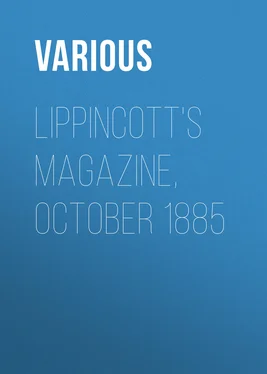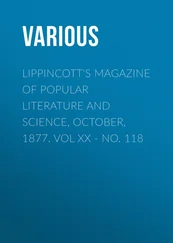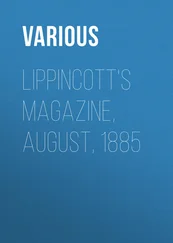Various - Lippincott's Magazine, October 1885
Здесь есть возможность читать онлайн «Various - Lippincott's Magazine, October 1885» — ознакомительный отрывок электронной книги совершенно бесплатно, а после прочтения отрывка купить полную версию. В некоторых случаях можно слушать аудио, скачать через торрент в формате fb2 и присутствует краткое содержание. Издательство: Иностранный паблик, Жанр: foreign_antique, periodic, foreign_edu, на английском языке. Описание произведения, (предисловие) а так же отзывы посетителей доступны на портале библиотеки ЛибКат.
- Название:Lippincott's Magazine, October 1885
- Автор:
- Издательство:Иностранный паблик
- Жанр:
- Год:неизвестен
- ISBN:нет данных
- Рейтинг книги:4 / 5. Голосов: 1
-
Избранное:Добавить в избранное
- Отзывы:
-
Ваша оценка:
- 80
- 1
- 2
- 3
- 4
- 5
Lippincott's Magazine, October 1885: краткое содержание, описание и аннотация
Предлагаем к чтению аннотацию, описание, краткое содержание или предисловие (зависит от того, что написал сам автор книги «Lippincott's Magazine, October 1885»). Если вы не нашли необходимую информацию о книге — напишите в комментариях, мы постараемся отыскать её.
Lippincott's Magazine, October 1885 — читать онлайн ознакомительный отрывок
Ниже представлен текст книги, разбитый по страницам. Система сохранения места последней прочитанной страницы, позволяет с удобством читать онлайн бесплатно книгу «Lippincott's Magazine, October 1885», без необходимости каждый раз заново искать на чём Вы остановились. Поставьте закладку, и сможете в любой момент перейти на страницу, на которой закончили чтение.
Интервал:
Закладка:
Mrs. Tarbell stood in the established attitude of a woman in front of a rainy-day gutter, holding her skirts with one hand and leaning forward at such an angle that the drippings from the mid-rib of her umbrella fell in equal streams upon the small of her back and a point precisely thirteen inches from the tips of her galoshes.
"Bring her in here," cried Mrs, Tarbell, shaking her umbrella. "Bring her in here." And she waved the umbrella in an elliptical curve about her head.
"Where?" said the foremost of those addressed, an active-looking man with a red moustache, a wet fur cap, and an umbrella under his arm.
"Here," said Mrs. Tarbell, thrusting her umbrella at the Land and Water Company's building. To make her directions more accurate, she went to the steps and nodded at the hall-way.
"The lady is my—has just been having a consultation with me," said Mrs. Tarbell to the man in the red moustache, "and—"
"Which way?" said he.
"Right up-stairs: the first door at the head of the stairs, on the third floor. I think you had better take her up in the elevator, because—"
"Cert'nly, cert'nly," he said, interrupting Mrs. Tarbell, who had intended to be as brief and business-like as possible.
Mrs. Tarbell followed the procession into the elevator, and when they arrived on the third floor, John, the office-boy, had already opened the door, scenting an excitement afar off with curious nostril, as it were; and Mrs. Stiles was duly carried in and laid on the sofa. "John, get some water instantly," cried Mrs. Tarbell. And at the same moment a red-cheeked young man bustled into the room and said that he was a doctor.
He pushed everybody out of the way, darted to the sofa, took off his hat. "Heard there was an accident, and if my services—unless there is another practitioner—thank you, sir, you are doing the very best thing possible; and now let us see whether there is a fracture," he said.
The promptitude and directness with which this young gentleman went to work commanded the attention and admiration of all the spectators. He asked for water, he called for salts of ammonia, he ran his hands lightly over Mrs. Stiles's prostrate form, all in an instant; then he asked how the accident had happened.
"She tried to get on while the car was going," growled the conductor, who had accompanied the party up-stairs.
"I'll bet she didn't," observed the party with the red moustache.
"Ankle, probably," murmured the doctor to himself. "Possibly a rib also." And in a minute or two he was able to declare that the injury had been done to the lady's ankle, the lady herself having assisted him to this conclusion by coming to her senses, groaning, and putting her hand down to the suffering joint.
The conductor frowned. "What is the lady's name and address, please, ma'am?" he asked of Mrs. Tarbell. "I have to make a report of the accident."
" You 'll find it out soon enough," said a thin man with a fresh complexion, very silvery hair, and spectacles. "The company will not have to wait long for the information." He looked about with a cheerful smile, and the conductor glared at him contemptuously. " She never tried to get on while you were going," continued the thin man. "It was your driver; that's what it was."
"The lady's name is Stiles, conductor," said Mrs. Tarbell,—"Stiles; and she lives—dear me!—on Pulaski Street. Can I do anything for you, doctor?"
"You might send your boy for a carriage," said the doctor, who was engaged in removing Mrs. Stiles's shoe. "Nothing else, thank you, unless you happen to have some lead-water about you." He gave a professional smile, and Mrs. Stiles groaned dismally.
Mrs. Tarbell despatched John for the carriage, and then, turning, and blushing in a way that was rather out of keeping with her tone of voice, she said, "Now, I should be obliged if you gentlemen who saw the accident would furnish me with your names and addresses."
On hearing this the crowd began to diminish rapidly; but the man with the red moustache set a good example by giving his name loudly and promptly as "Oscar B. Mecutchen, tobacconist, d'reckly opposite the City Hall." So three or four other men allowed Mrs. Tarbell to set them down as observers of the disaster. The gentleman in spectacles was named Stethson, another man, a tall, fat-cheeked countryman, Vickers, and a dried up little party, in a Grand-Army-of-the-Republic suit, Parthenheimer. Mrs. Tarbell had the names down pat, and scrutinized each prospective witness carefully, as if warning him that it would be no use for him to give a fictitious name in the hope of evading his duties, as she would now be able to pick him out of a regiment.
"I am very much obliged to you," she said, in a stately manner. "Now, you all agree that the accident was the result of the negligence of the driver of the car?"
"Why, yes, certainly," they all agreed at once.
"Leastways—" said Mecutchen.
"That is—" said Parthenheimer.
"How was it, anyway?" asked Stethson.
"Thought you saw it," cried the others, turning on him instantly.
"So I did," said Stethson; "but I thought I'd like to hear what you gentlemen's impression was."
"Well," said Mecutchen and Vickers, the tall man, together, tipping back their hats with a simultaneous and precisely similar movement on the part of each,—nothing is more indicative of the careful independence of the average American than the way in which he always keeps his head covered in the presence of his lawyer,—"Well," said Vickers and Mecutchen.
Mr. Mecutchen bowed to Mr. Vickers, and Mr. Vickers bowed to Mr. Mecutchen, with a sort of grotesque self-effacement. Mr. Vickers waved his hand, and Mr. Mecutchen proceeded.
"Why," said he, "the lady stopped the car in the middle of the block,—just like a woman,—got on the platform, car started with a jerk, and she fell off."
Vickers and Parthenheimer nodded assent, but Stethson said that his view of it was that the car started off again while she was trying to get on.
"That makes it stronger," said Mecutchen.
"Well, of course," said Stethson, settling his spectacles farther back on his nose; and Vickers murmured that you couldn't have it too strong, as he knew from the point of view (as he said) of cows. "It's wonderful what you can get for cows," he added pensively.
"Ag'in' a railroad company," said the grizzled old Parthenheimer, "the stronger the better, because some cases, no matter how aggerawated they are, you only git a specific sum and no damages. But a railroad case, which is a damage case right through, the worse they are the more you git. I had a little niece to be killed by a freight-train, and they took off that pore little girl's head, and her right arm, and her left leg, all three, like it was done by a mowing-machine,—so clean cut, you know. Well, sir, they got a werdick for six thousand dollars, my brother and his wife did; and their lawyer stood to it that the mangling brought in three thousand; and I think he was right about it, too."
"Six thousand!" said Vickers, with immense appreciation.
"The court set it aside for being excessive," said Parthenheimer," and aft'werds they compromised for less. But there it was. And the way it was done was odd, too. Right arm and left leg."
"Ah," said Vickers, "living right on a railroad, the way I do, you see some queerer accidents than that. Now, I remember—"
But Mrs. Tarbell found this conversation growing quite too ghastly to be listened to with composure, so she turned abruptly toward the sofa. The doctor was now bathing and examining Mrs. Stiles's ankle, and Mrs. Stiles looked not merely the picture but the dramatic materialization of misery.
"How do you feel now, Mrs. Stiles? How do you think she is, doctor?"
These two questions were put in Mrs. Tarbell's sweetest tones.
Читать дальшеИнтервал:
Закладка:
Похожие книги на «Lippincott's Magazine, October 1885»
Представляем Вашему вниманию похожие книги на «Lippincott's Magazine, October 1885» списком для выбора. Мы отобрали схожую по названию и смыслу литературу в надежде предоставить читателям больше вариантов отыскать новые, интересные, ещё непрочитанные произведения.
Обсуждение, отзывы о книге «Lippincott's Magazine, October 1885» и просто собственные мнения читателей. Оставьте ваши комментарии, напишите, что Вы думаете о произведении, его смысле или главных героях. Укажите что конкретно понравилось, а что нет, и почему Вы так считаете.












